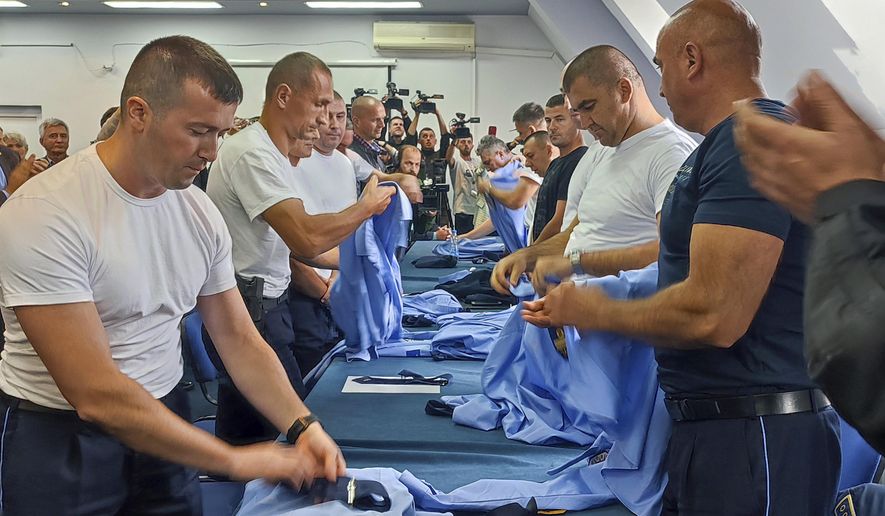PRISTINA, Kosovo (AP) — Representatives of the ethnic Serb minority in Kosovo on Saturday resigned from their posts in protest over the dismissal of a police officer who did not follow the government’s decision on vehicle license plates.
Earlier this week Pristina authorities dismissed a senior Serb police officer in northern Kosovo, where most of the ethnic Serbs live, who refused to respect the decision to change vehicle license plates in Kosovo to ones issued by Kosovo. The shift has ignited volatile issues about Kosovo’s sovereignty, especially among its Serb minority, many of whom still want the former Serb province to be part of Serbia and not independent.
Serbia itself has never recognized the independence of Kosovo.
As the measure came into effect Tuesday, Kosovo authorities said enforcement would be gradual. In three weeks Pristina authorities will be issuing warnings to the ethnic Serbs who keep their old license plates. For the next two months they will be fined, and the next three months they can drive only with replaced temporary local plates.
Ethnic Serbs have a government minister, 10 parliamentarians and other top posts in governing, police and judiciary in their four local communities. All resigned and senior police officers symbolically took off their uniforms Saturday. The effect of the mass resignation was unclear.
Both Pristina and Belgrade toughened their language and accused each other of violating the deals they have reached at EU-mediated negotiations. The European Union has told Kosovo and Serbia they must normalize ties if they want to advance toward membership in the 27-nation bloc.
Kosovar President Vjosa Osmani accused Belgrade of exerting pressure on Kovoso’s ethnic Serb minority.
“Such a move urged from Serbia proves again what we have repeated many times, that Serbia is destabilizing Kosovo and the region because of its territorial and hegemonistic goals,” said Osmani.
Kosovar Prime Minister Albin Kurti called on the ethnic Serbs not to boycott the local institutions, “not to fall prey of political manipulations and geo-political games.” Kurti claimed that Serbian President Aleksandar Vucic was lying to American and European envoys and ”often meets with and coordinates with the Russian ambassador to Belgrade.”
“Not being a democratic country, Serbia is becoming a Kremlin tool,” Kurti posted on social media.
In Belgrade, Vucic attended a government session, met the Serbian Orthodox Church Patriarch Porfirije, as well as the ambassadors of allies Russia and China, to discuss the situation in Kosovo. Vucic also spoke on the phone with the U.S. ambassador in Belgrade.
Vucic said Serbia is determined to strongly defend its vital national interests.
Serbia’s Prime Minister Ana Brnabic accused Pristina authorities of increasing attacks “on Serbs … their property was illegally taken away, rare returnees were most brutally harassed and expelled again, innocent people arrested and convicted.”
Trouble brewed this summer over Serbia’s and Kosovo’s refusal to recognize each other’s identity documents and vehicle license plates. Kosovo Serbs in the north put up roadblocks, sounded air raid sirens and fired guns into the air.
In August, EU and U.S. envoys negotiated a solution to the travel documents problem, allowing the situation to calm down.
Pristina also postponed to Nov. 1 the decision to require vehicles holding old or Serbian license plates to replace them with Kosovar ones. That also meant that vehicles entering from Serbia had to replace Serbian license plates with Kosovo ones.
For the past 11 years, the reverse has been required by Serbia for vehicles coming in from Kosovo.
Kosovo’s 2008 independence has been recognized by the United States and most EU countries, while Serbia has relied on support from Moscow and China for its bid to retain the former province.




Please read our comment policy before commenting.